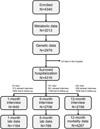Translational Research Investigating Underlying Disparities in Acute Myocardial Infarction Patients' Health Status (TRIUMPH): design and rationale of a prospective multicenter registry
- PMID: 21772003
- PMCID: PMC3376532
- DOI: 10.1161/CIRCOUTCOMES.110.960468
Translational Research Investigating Underlying Disparities in Acute Myocardial Infarction Patients' Health Status (TRIUMPH): design and rationale of a prospective multicenter registry
Abstract
Background: Black patients with myocardial infarction (MI) have worse outcomes than white patients, including higher mortality rates, more angina, and worse quality of life. The Translational Research Investigating Underlying Disparities in Acute Myocardial Infarction Patients' Health Status (TRIUMPH) study was designed to examine whether racial differences in socioeconomic, clinical, genetic, metabolic, biomarker, or treatment characteristics mediate observed disparities in outcomes.
Methods and results: Between April 11, 2005, and December 31, 2008, 31 567 patients with MI were prospectively screened; 6152 had an eligible MI, and 4340 (71%) were enrolled from 24 US centers. Consenting patients had detailed chart abstractions of their medical history and processes of inpatient care, supplemented with a detailed baseline interview. Detailed genetic and metabolic data were obtained at hospital discharge in 2979 (69%) and 3013 patients (69%), respectively. In a subset of patients, blood and urine samples were obtained at 1 month (obtained in 27% of survivors) and blood samples at 6 months (obtained in 19% of survivors). Centralized follow-up interviews sought to quantify patients' postdischarge care and outcomes, with a focus on their health status (symptoms, function, and quality of life). At 1, 6, and 12 months, 23%, 27%, and 24%, respectively, were lost to follow-up. Vital status was available for 99% of patients at 12 months.
Conclusions: TRIUMPH is a novel MI registry with detailed information on patients' sociodemographic, clinical, treatment, health status, metabolic, and genetic characteristics. The wealth of patient data collected in TRIUMPH will provide unique opportunities to examine factors that may mediate racial differences in mortality and health status after MI and the complex interactions between genetic and environmental determinants of post-MI outcomes.
Conflict of interest statement
Figures




References
-
- Lloyd-Jones D, Adams RJ, Brown TM, Carnethon M, Dai S, De Simone G, Ferguson TB, Ford E, Furie K, Gillespie C, Go A, Greenlund K, Haase N, Hailpern S, Ho PM, Howard V, Kissela B, Kittner S, Lackland D, Lisabeth L, Marelli A, McDermott MM, Meigs J, Mozaffarian D, Mussolino M, Nichol G, Roger VL, Rosamond W, Sacco R, Sorlie P, Thom T, Wasserthiel-Smoller S, Wong ND, Wylie-Rosett J. Heart disease and stroke statistics--2010 update: A report from the american heart association. Circulation. 2010;121:e46–e215. - PubMed
-
- Henry J. Racial/ethnic differences in cardiac care: The weight of the evidence. Menlo Park, CA: The Henry J. Kaiser Family Foundation; 2002. Kaiser Family Foundation ACoCF.
-
- Nelson AR. Unequal treatment: Report of the institute of medicine on racial and ethnic disparities in healthcare. Annals of Thoracic Surgery. 2003;76:S1377–S1381. - PubMed
-
- Services USDoHaH. Healthy people 2010: Understanding and improving health. 2000
-
- Rathore SS, Krumholz HM. Differences, disparities, and biases: Clarifying racial variations in health care use. Ann Intern Med. 2004;141:635–638. - PubMed
Publication types
MeSH terms
Grants and funding
LinkOut - more resources
Full Text Sources
Medical
Molecular Biology Databases
Miscellaneous

